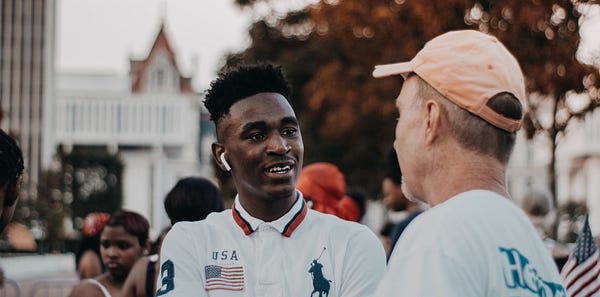3 Things We Can Learn from any Conversation

Mentors are great. People to learn from are great. It’s awesome to meet new people. But, what if we don’t know what to talk about? I’m going to share 3 things I usually learn from a conversation as well as the typical questions I ask.
John Maxwell once said something along the lines of, “I realized that I’m really not that interesting, so I began quoting other people. I have a collection of organized quotes at my desk, and often, I quote God’s word.”
I’d focus again, on the 80/20 rule of communication. Spend 80% of the time talking about the person in the conversation that isn’t you and only 20% talking about yourself.
There’s something to learn from everyone. I totally believe that. I love doing “research” and just listening and learning.
What you learn or what you can learn is going to vary 100% by the direction of the conversation and the focus of it.
The things that are typically learned from people fall into 3 different categories:
1. How they overcame failures
2. What they are passionate about
3. How their mind works
1. How they overcame failures
The first is probably the most common. People overcome failures all the time. If we ask anyone to talk about their history and how they got to where they are now, chances are, they experienced a major setback or failure throughout their life’s journey.
People are not usually hesitant to talk about that.
Many don’t like to boast, but if you ask — it’s not boasting when they tell you.

People have an inner desire to help others. Even if they don’t explicitly state that, everyone knows how rewarding it feels to help others. That’s in our nature.
In a one-on-one situation, people will be more willing to help us if they’re already there with us. They’ve already invested in the meeting by coming.
But, it’s up to you to ask the right questions and learn about their failures and resulting successes.
2. What they are passionate about
I like to understand the driving forces. This is what makes people who they are.
Outside of work, what do they do? Why do they work?
Because let’s be honest, nobody HAS to work like they do.
They work in the way they do for a certain reason, what is that? That’s the main thing we should seek to understand.

People do many different things in their lives, but there’s a reason they do each and everyone — but they might NOT see it for themselves.
People might not understand that the real reason that they’re working where they are is because they love their parents and want to make them proud. But they might not realize that.
You need to ask probing questions. But to me, there’s a balance, each person is different. Some people might be offended by certain questions, others won’t be.
But, to understand someone’s passion, we need to pursue a topic that lights up their eyes and brings energy to their face.
3. How their mind works
This is probably the item that we need to be most intentional about of the three. People are not likely going to explicitly tell you how their mind works and why. But, it is possible to find out.
Tony Robbins says, “Successful people ask better questions, and as a result, they get better answers.”
If we want to learn how someone’s mind works, we need to ask the right questions.
I love the simple question, “when you think of a leaf, what do you think of?”
One type of person, an intuitive person based on the MBTI, would think of things like the surroundings, the season, the weather, and seek to tell a story.
Someone who is more sensing, again based on the MBTI, uses their 5 senses and will think about the finer details of the leaf itself, things like what color the leaf is, how fresh it is, the veins on it, etc.
Bottom line, if we want good answers, we need to ask good questions.
As Todd Mullins says, “If you aren’t teachable, you aren’t teamable.”
How do you become teamable? You learn what drives others and you use that, you build on that.
I love prying.
If the person I’m talking to says one thing, I want to understand their reasoning, their values, and their beliefs. We need to understand the biases they have that are causing them to think a certain way. It does NOT matter what we believe, we’re learning.
There’s something my grandfather used to share that my Dad adores to this day.
Papa would say, “I have ideas I haven’t thought of yet.”
Here are the typical questions that I ask
To learn about their failures:
- How did you get to where you are now?
- What was an unexpected challenge for you?
- Who helped you along the way? Why?
To learn about their passions:
- What attracted to what you are doing? What keeps you coming back? Why?
- Who do you care about most in this world, why?
- If you didn’t do what you do, what would you do instead?
- One I’d be a little cautious to ask, “You don’t HAVE to be doing this, do you? What decisions have you made that tie you to this decision?”
To learn about their mind:
- Did you hear about (reference something you saw recently) and what did you think?
- What was the most interesting development at your position recently?
- After they say something interesting or something that’s new to you, pry a little bit.
- You said (reference something they said just a bit ago) what made that interesting to you? What excited you about that?
There are so many different ways to learn from others and so many different things that we can do.

These are just 3 of the things that I typically look to do and learn when meeting with mentors or new people that we meet.
What are the most valuable things that you’ve learned from someone in a recent conversation?